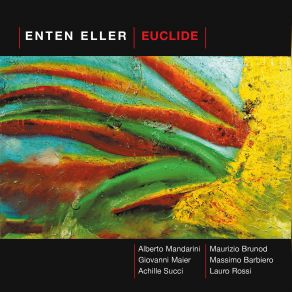Euclide
Download links and information about Euclide by Enten Eller. This album was released in 2003 and it belongs to Jazz genres. It contains 11 tracks with total duration of 54:04 minutes.

|
|
|---|---|
| Artist: | Enten Eller |
| Release date: | 2003 |
| Genre: | Jazz |
| Tracks: | 11 |
| Duration: | 54:04 |
| Buy it NOW at: | |
| Buy on iTunes $8.99 | |
Tracks
[Edit]| No. | Title | Length |
|---|---|---|
| 1. | Cruna | 7:23 |
| 2. | Funk Hit | 5:52 |
| 3. | Il furgone giallo | 2:59 |
| 4. | Isengard (Pt. A) | 3:37 |
| 5. | Isengard (Pt. B) | 5:04 |
| 6. | Alcide's Mood | 8:18 |
| 7. | Briseide | 5:41 |
| 8. | Marcia lenta | 5:34 |
| 9. | Momi's Dance | 7:08 |
| 10. | Ifigenia | 1:52 |
| 11. | Porte basse | 0:36 |
Details
[Edit]This is the eighth album of Enten Eller, and it was recorded nearly 20 years after Massimo Barbiero founded the group in 1984, a remarkable lifespan for jazz. This one does not include guests, although Achille Succi is a good replacement for the American alto saxophonist Tim Berne, who performed effectively on earlier albums with the group. There is no new ground broken here, with the emphasis still on the serious writing mostly of Barbiero, though, of course, the large improvisational element is critical. The group draws from a multitude of influences. You can hear George Russell's hand from the early '60s in "Alcide's mood," for example, with its slightly discordant melody played by the trombone and trumpet, or the influence of Carla Bley in Giovanni Maier's clever harmonies on "Marca lenta," with its weird muted trumpet and hardcore electric guitar. Elsewhere, you might hear the ethereal qualities of Bill Frisell, or wildly freestyle blowing, or even simple straight-ahead hard bop. The mix is sometimes somewhat disconcerting, as there is sense of smorgasbord. As with earlier recordings, the underlying essence of the band keeps the listener off guard: is it the rock-infused beats of Maurizio Brunod, or the stylized writing of Barbiero, or the top-flight solos from trombonist Lauro Rossi, trumpeter Alberto Mandarini, and the remainder of the band? All of these contribute, and while the guitar and drums keep the group grounded, the horns, in particular, veer outside, resulting at times in some extraordinary results. Rossi shows that he's been listening to Roswell Rudd, and the Italian takes advantage, often with mutes, of the considerable opportunity to solo. Throughout the album there are special moments, continuing a two-decade old tradition of high-level musicianship that often defies categorization.